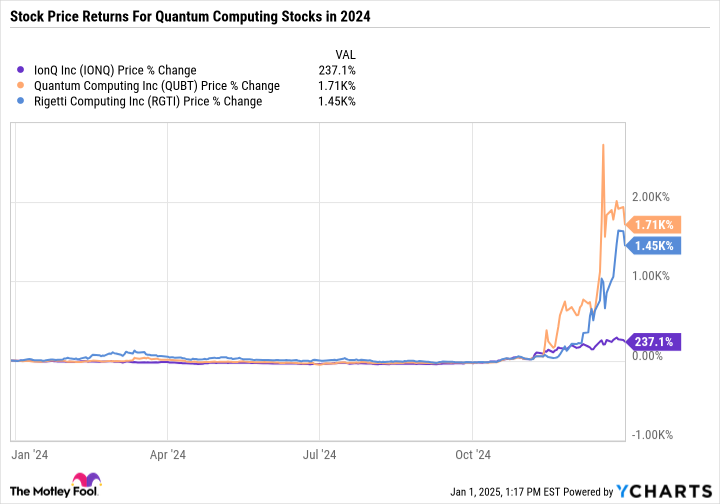Over the last couple of years, technology stocks have captivated the investment world thanks in large part to breakthroughs in artificial intelligence (AI).
Within the AI realm, semiconductor stocks in particular have benefited greatly. This is due to the fact that semiconductor companies such as Nvidia, Advanced Micro Devices, and Broadcom make important infrastructure such as graphics processing units (GPUs) and network equipment that are used in data centers, and without them, generative AI would be more of a lofty idea than a reality.
While chip stocks should remain a popular choice for investors, I see a new theme emerging in the AI landscape. Over the last few months, quantum computing stocks have witnessed some outsized gains — putting them on the radar of curious investors.
Below, I’m going to explore what is driving this pronounced buying activity and assess if quantum computing is an area you should explore in 2025.
Quantum computing is entering the spotlight
Quantum computing is an interesting concept, in theory. In very simple terms, quantum computers leverage technology known as quantum mechanics, which is believed to enhance applications such as machine learning to solve extremely sophisticated, time-consuming problems that today’s computers simply cannot do.
Some of the more notable quantum computing stocks that have become mainstream recently are IonQ (IONQ -2.90%), Quantum Computing (QUBT -3.32%), and Rigetti Computing (RGTI -5.74%).
According to their websites, these companies have partnered with major technology enterprises including Nvidia, Amazon, Alphabet, Microsoft, and even government operations such as NASA and leading healthcare systems such as Johns Hopkins.
Image source: Getty Images.
How are quantum computing stocks moving?
The chart below illustrates the stock price movements for IonQ, Quantum Computing, and Rigetti Computing during 2024. Before getting enamored by these market-beating gains, zoom out and look at the bigger picture.
Do you see what I see? For almost the entirety of 2024, none of these stocks moved… at all! It wasn’t until around October and November that all three stocks started moving essentially in tandem. So, what happened?
Do moves of this magnitude make sense?
As a long-term investor, I am more aligned with stocks that experience steady gains over time as opposed to more volatile “peak and valley” trends. Broadly speaking, I tend to think that stocks experiencing abnormally high levels of buying or selling make sense in a finite number of scenarios.
For example, if a small biotech company is granted approval from the Food and Drug Administration for a new, breakthrough medication, then I think it’s appropriate for the stock to rise significantly. The same can also be true if a pharmaceutical company experiences a setback during a clinical trial.
However, this is far from the case with the quantum computing stocks above. While I cannot point to one singular reason as to why these stocks are soaring, I do think I’ve uncovered some peripheral details that are playing a role in their ongoing price appreciation.
Back in 2020, you may remember that shares of GameStop began to unexpectedly soar. As it turns out, the surge in GameStop was a short squeeze, and the catalyst sparking this abnormal trading volume was traced back to a forum on Reddit called r/wallstreetbets. While the GameStop saga is ancient history, r/wallstreetbets remains fertile ground for investors to chat about stocks in an anonymous way. In my opinion, the overwhelming majority of stocks covered on r/wallstreetbets are extremely speculative.
In recent months, there have been numerous mentions of IonQ, Rigetti, and Quantum Computing all over Reddit. In fact, one post from a couple of months ago within r/wallstreetbets that was titled “My 100x companies” received over 400 responses — and the first company on this user’s list was (wait for it!) IonQ.
Outside of Reddit, there have also been some intriguing updates on quantum computing technology that have come out of big tech. Specifically, Google announced a major breakthrough in its new quantum Willow chip. Meanwhile, IonQ also announced that it is currently running tests on Nvidia’s CUDA-Q quantum software.
All of the activity detailed above has occurred within the last two months. I do not find it coincidental in the slightest that the pronounced buying activity in the quantum computing stocks I’ve explored in this piece overlaps with these news updates and heightened interest found in online communities.
Should you invest in quantum computing stocks in 2025?
While IonQ, Quantum Computing, and Rigetti present interesting opportunities, none of them have really scaled yet — despite their partnerships with big tech and the federal government. The reason for this is that quantum computing has almost no tangible use cases right now. This is precisely why I said in my introduction that the technology is interesting “in theory.”
To me, investors are finding reasons to buy quantum computing stocks that are disconnected from reality — speculatively labeling the technology as the “next big thing” in AI. However, it’s pretty clear that the trends seen in the chart above underscore the meme stock nature of names like IonQ, Rigetti, and Quantum Computing.
I think there is a good chance that the momentum fueling these names could carry over into 2025, but that doesn’t make these stocks a prudent investment opportunity.
If you’re interested in gaining exposure to quantum computing, I’d suggest investing in names such as Alphabet or IBM. While both companies are making headway in quantum computing, neither one is mortgaging the future of their respective businesses on this technology. Looked at in a different way, if IonQ, Rigetti, or Quantum Computing fail to progress in quantum mechanics, each company will be hard-pressed for growth. The same cannot be said for Alphabet or IBM, which dominate in several different fields — including advertising, cloud computing, IT infrastructure, and many more.
John Mackey, former CEO of Whole Foods Market, an Amazon subsidiary, is a member of The Motley Fool’s board of directors. Suzanne Frey, an executive at Alphabet, is a member of The Motley Fool’s board of directors. Adam Spatacco has positions in Alphabet, Amazon, Microsoft, and Nvidia. The Motley Fool has positions in and recommends Advanced Micro Devices, Alphabet, Amazon, Microsoft, and Nvidia. The Motley Fool recommends Broadcom and International Business Machines and recommends the following options: long January 2026 $395 calls on Microsoft and short January 2026 $405 calls on Microsoft. The Motley Fool has a disclosure policy.

